Hello!
How can your social media habit impact your everyday life? Semify wanted to find out more about how our online behavior has changed over the last five years. Read on to learn about the findings of their 2021 Social Media Conduct Survey.
Social media is a nearly ubiquitous part of our daily lives. In fact, data shows that 3.78 billion people are now using social media worldwide and that 2020 saw a 5% jump in social media use – a trend perpetuated by the COVID-19 pandemic.
But while we know that more people are using these platforms, we don’t always know how they’re interacting with them. We’re aware of what’s happening in our own little bubbles, thanks to our curated feeds and ever-improving algorithms. But to see the bigger picture, we have to branch out beyond our own online communities.
Enter: Semify’s Social Media Conduct Survey.
 Our white label SEO agency conducted its first Social Media Conduct Survey in 2016. This initial social media survey allowed us to gather data firsthand and see for ourselves how respondents viewed and interacted with social networking platforms. We followed that up with a second Social Media Conduct Survey in 2018.
Our white label SEO agency conducted its first Social Media Conduct Survey in 2016. This initial social media survey allowed us to gather data firsthand and see for ourselves how respondents viewed and interacted with social networking platforms. We followed that up with a second Social Media Conduct Survey in 2018.
The world has changed considerably since then. But it may surprise you that certain opinions actually haven’t evolved that much. It actually shocked us that many people still believe some major misconceptions about social media use and its potential impact on employment.
In this post, we’ll explore social media trends, learn what our most recent Social Media Conduct Survey revealed about current behavior, and compare how those findings stack up to those from 2016 and 2018.
Breaking Down Our Social Media Questionnaire Survey
 First, let’s talk about what we included in the 2021 Social Media Conduct Survey. For this latest iteration, we included 8 survey questions regarding social media use. Some of these questions mirror those that had been included in our previous surveys, while others were new additions.
First, let’s talk about what we included in the 2021 Social Media Conduct Survey. For this latest iteration, we included 8 survey questions regarding social media use. Some of these questions mirror those that had been included in our previous surveys, while others were new additions.
We wanted to take a well-rounded approach to this social media usage survey that would give us information about both overall utilization and beliefs pertaining to certain social media behaviors.
Our social media survey asked respondents about:
- How much time they spend on social media each day
- Whether they ever use social media in the workplace
- How often they create social media posts relating to divisive issues
- Whether they’ve ever criticized or complained about their job, boss, or coworkers on social media
- Which social media behaviors would be the biggest causes for concern during the hiring process
- Whether they’ve ever passed on a candidate due to social media behavior
- How they feel about social media screening for employment
- Whether they feel firing employees for social media posts is an illegal infringement of rights
That’s a lot of ground to cover and the responses varied quite a bit from question to question. We’ll show you what we found, as well as what additional data from other sources tells us, below.
The Answers to Our Survey Questions On Social Media Usage
Question 1: How Much Time Do You Spend on Social Media Per Day?
The first question on our social media survey was pretty straightforward. We wanted to know just how much time our respondents typically spend on social media platforms on a daily basis.
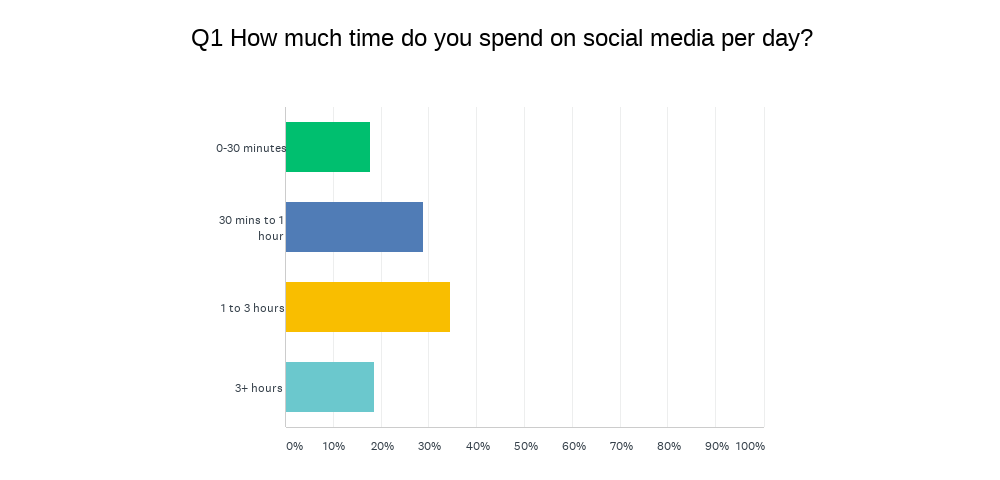
We gave them 4 different options:
- 0-30 minutes
- 30 minutes to 1 hour
- 1 to 3 hours
- 3 hours or more
As you’ll see in the chart below, 63.5% of respondents spend anywhere from a half hour to 3 hours using social media channels on the average day. Nearly 18% said they spend less than 30 minutes on social media each day, while less than 19% said they spend more than 3 hours on these platforms.

 The answers to this question weren’t particularly astonishing to our team. A recent social media usage survey found that North American social media users spend a little over 2 hours per day on these platforms. Statista also reports that internet users worldwide spent an average of 145 minutes per day (or 2 hours and 41 minutes) on social media.
The answers to this question weren’t particularly astonishing to our team. A recent social media usage survey found that North American social media users spend a little over 2 hours per day on these platforms. Statista also reports that internet users worldwide spent an average of 145 minutes per day (or 2 hours and 41 minutes) on social media.
That essentially means that most of our respondents are using social media at a fairly expected frequency. But when are they using these platforms throughout the day?
Question 2: Do You Ever Use Social Media While At Work?
For many people, the days of being forced to put their phones away in the workplace are over. Between the increased need for social media marketing experts and an emphasis on the benefits of remote work, it’s no wonder that more employers and employees alike have no problem with using social media platforms while on the clock.
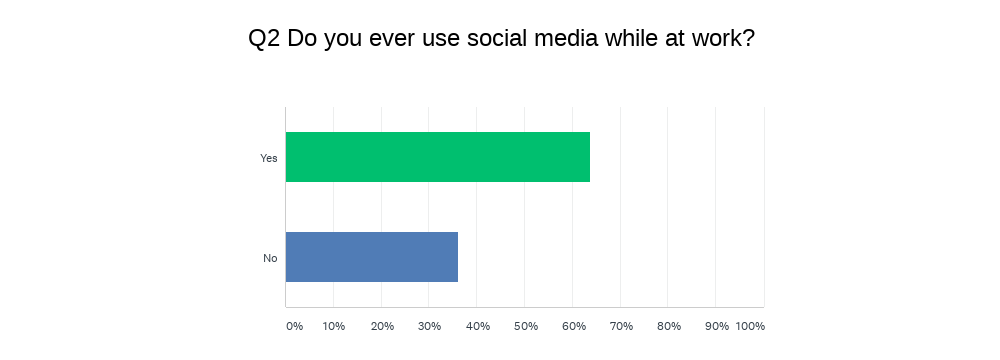
Still, our 2021 Social Media Conduct Survey respondents showed an almost 60/30 split on this one. Nearly 64% of participants affirmed that they use social media while at work, while just over 36% said they don’t.

Interestingly, the response we received seems to represent a more conservative side of things. Older Pew Research Center data suggests that as many as 80% of workers were using social media while on the job in 2016, while Digital Information World reports that 77% of employees access social media at work.
It’s not likely that social media use has decreased in the workplace, so it may be worth noting that 36.5% of our survey respondents are between the ages of 45 and 60 – a demographic that may simply be less likely to engage in general social media use or break the rules at work.
We wanted to ask this question for a few different reasons. For one thing, it shows us how certain conventions have evolved over time. Secondly, this gives some insight into how many social media users are divvying up their hourly usage. Many have no qualms about scrolling through their feeds during the average day, even if it’s not during their “free” time. And thirdly, it’s a good segue into some of our other survey questions that deal with social media behavior and its impact on employment. (But more on that a little later!)
Question 3: How Often Do You Post About Divisive Issues on Social Media?
The next question is a holdover from our two previous social media surveys. This time, we asked, “How often do you post comments or share content on social media about divisive issues like politics or religion?”
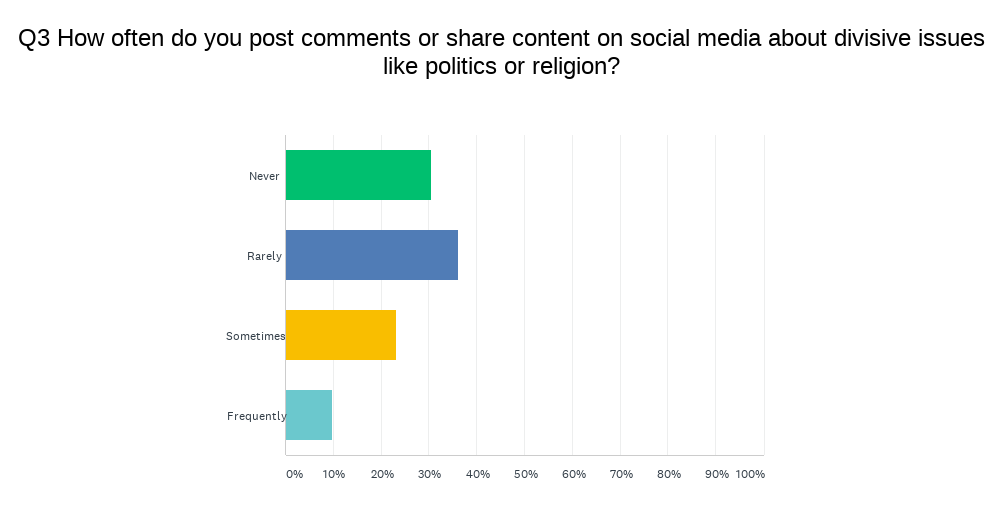
In a nation that’s become increasingly political (and increasingly divided), this response wasn’t totally unanticipated. As you can see from the numbers below, around 66.8% of participants said they never or rarely publish posts or comments that relate to divisive topics. But around one-third (33.15%) of respondents said they sometimes or frequently share this kind of content.

It’s worth noting that our question was intentionally broad. Certain posts related in some way to religion might not be seen as controversial, while content that’s deemed to be “political” may be misclassified in this manner when they actually pertain to public health or racial equality.
We didn’t specify whether these posts might be considered to be extreme or which side of the political spectrum they might fall on. And, of course, there’s also a big difference between a post about a church fundraiser and a potentially offensive meme about a public political figure.
Generally speaking, however, the conclusion we can draw from this response is that the majority of participants limit making these kinds of posts on social media. That may be hard to believe, given what many of us see in the comments sections of local news outlets. But according to our data, it seems that most people will generally refrain from posting about issues that could further divide their friends, family members, and followers.
These results are actually right on track with what the Pew Research Center shared earlier this year. Their data shows that 70% of social media users surveyed rarely or never post about political or social issues, with around 29% saying they do so sometimes or frequently. Even in the lead-up to the 2020 Presidential election, the majority of folks surveyed wanted to avoid posting anything that could be used against them or that might offend other people.
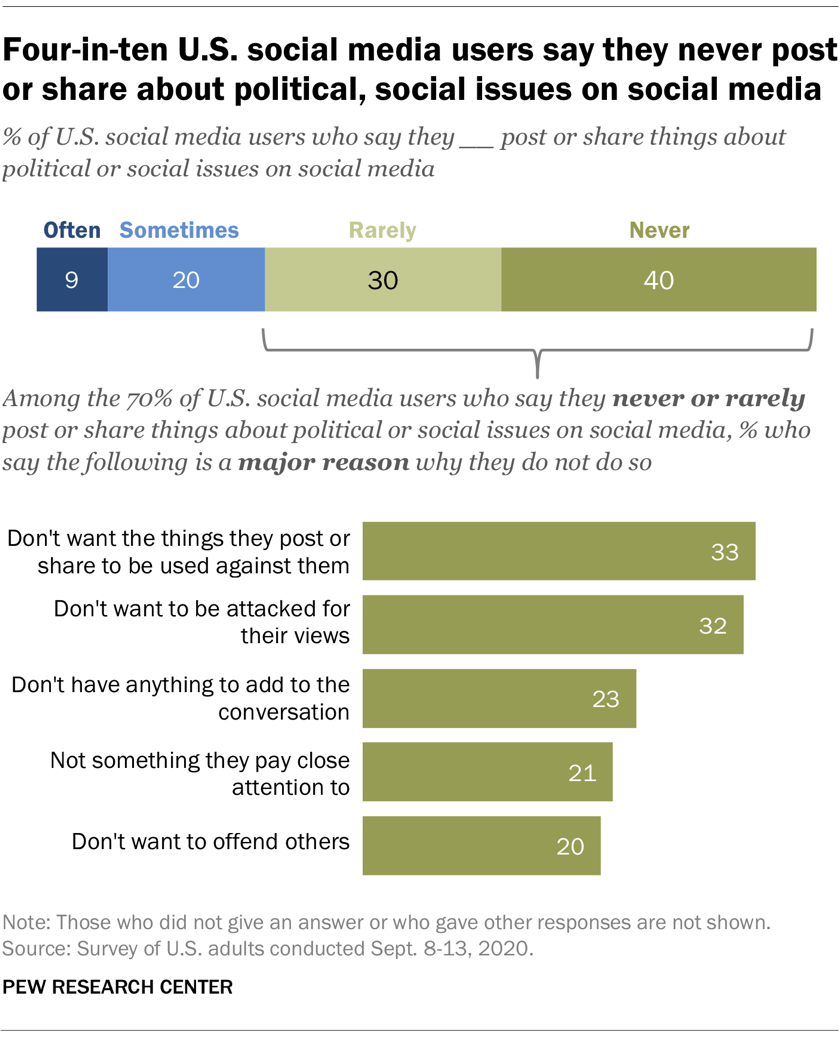
Certainly, people do post divisive things on social media. But most of us want to play nice and keep our opinions to ourselves. We’ll take a look at how this year’s response compares to those in our previous social media surveys later on.
Question 4: Have You Ever Posted Job-Related Complaints on Social Media?
In theory, we may know that we should keep our employer criticisms and complaints off of social media. But do we really do that in practice?
We wanted to find out. So we asked the question, “Have you ever criticized or complained about your employer, your work colleagues, or your job on social media?” This question is similar to those we asked in both 2016 and 2016, which will make for an interesting comparison in the next section. But in 2021, how do respondents feel about public employer and coworker gripes?
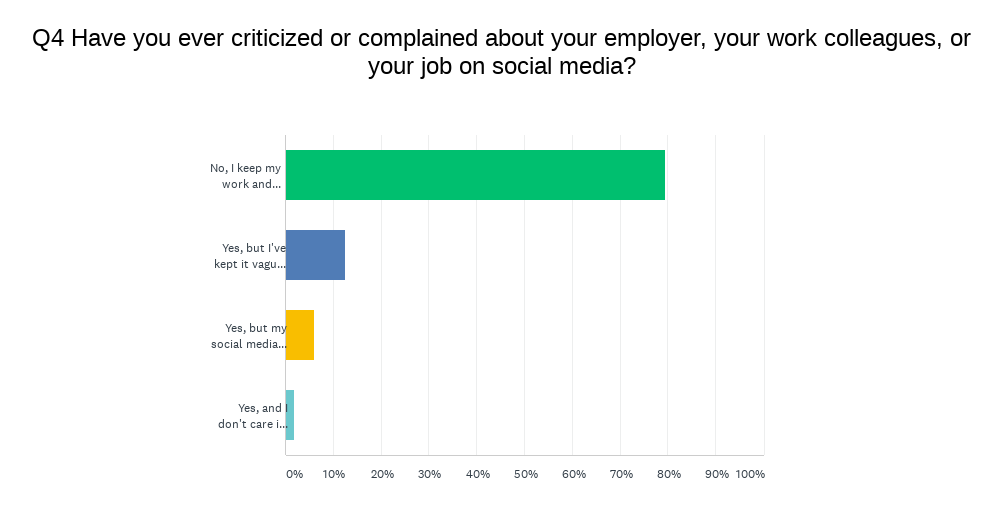
For this question, we again gave participants a choice of four different response options:
- No, I keep my work and personal life separate OR I have no complaints
- Yes, but I’ve kept it vague or left out identifying information
- Yes, but my social media profiles are private
- Yes, and I don’t care if others see what I’ve posted

Fortunately for both employers and employees, the vast majority of respondents chose the first response. Almost 80% of participants answered that they’ve never criticized or complained about their job, their employer, or their coworkers on social networking sites. Around 12.5% said that they have, but that they’ve done so in a way that they feel will keep details relatively anonymous.
Worryingly, almost 8% of respondents said that they have criticized their employers or their coworkers on social media and that they either don’t care about what someone might find or that they believe their account privacy settings will protect them.
 As far as online privacy goes, it seems as if some people are still under the impression that a “locked-down” social media account can safeguard what they post online. While PCMag reports that almost half of all social media accounts are now kept private, that doesn’t always guarantee that your information won’t fall into the wrong hands.
As far as online privacy goes, it seems as if some people are still under the impression that a “locked-down” social media account can safeguard what they post online. While PCMag reports that almost half of all social media accounts are now kept private, that doesn’t always guarantee that your information won’t fall into the wrong hands.
Not only do breaches and data leaks occur on a near-constant basis, but you may not even realize exactly what can and can’t be seen by others who just happen to come across your profile. Statista found that nearly 50% of social media users aged 60 and above either aren’t confident that they’ve selected the right privacy settings for their needs or they don’t use social media privacy settings at all.
Although the majority of social media users younger than 60 feel at least somewhat confident in their abilities to use these privacy settings correctly, it’s still possible that your posts could be seen by others outside your social media circle.
 In fact, our 2016 Social Media Conduct survey found that almost 24% of respondents aged 18 to 34 said they had taken a screenshot of someone else’s social media account to use against them. Currently, Snapchat is the only social media app that notifies users when someone else has taken a screen capture of their post. In other words, you may never even know that someone has betrayed your social media confidence – nor will you necessarily be able to definitively identify the Brutus on your friends list.
In fact, our 2016 Social Media Conduct survey found that almost 24% of respondents aged 18 to 34 said they had taken a screenshot of someone else’s social media account to use against them. Currently, Snapchat is the only social media app that notifies users when someone else has taken a screen capture of their post. In other words, you may never even know that someone has betrayed your social media confidence – nor will you necessarily be able to definitively identify the Brutus on your friends list.
Those who aren’t the least bit concerned with privacy features may learn a lesson the hard way. As we’ll see in the next questions from our latest Social Media Conduct Survey, inappropriate social media behavior can come with serious consequences – especially in the realms of hiring and firing.
Question 5: Which Social Media Faux Pas is the Biggest Red Flag When Hiring?
Although we knew that many of our survey respondents might not be involved in hiring employees, we wanted to know which of the worst social media behaviors would be most likely to derail a candidate’s application.
We asked, “Which of these social media faux pas would be the biggest red flag for you when screening a potential new employee?”
We gave our participants four different choices:
- Religious or political posts
- Posts with poor grammar and spelling
- Discriminatory or inappropriate posts
- Posts related to drugs, alcohol, or criminal activity
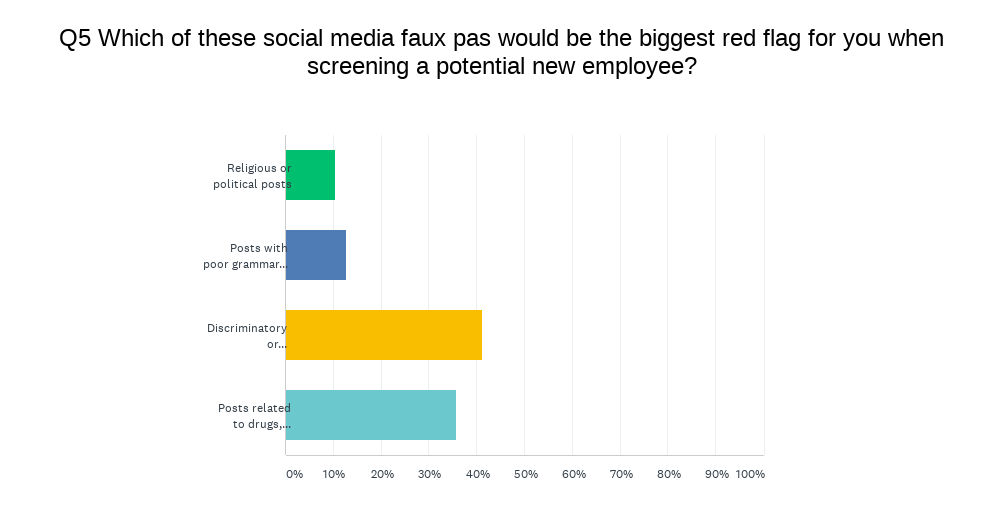
Again, there’s quite a bit of variety here – and there’s nothing to say that a respondent couldn’t consider all of these kinds of posts to be problematic during the hiring process. But we wanted to see which kinds of posts jumped out as the biggest issue for most respondents.

By far, our respondents said that discriminatory or inappropriate posts would be the biggest deterrent when hiring a potential employee. At a time when racism, misogyny, and antisemitism are constantly making headlines, it’s perhaps a small comfort to know that 41% of survey respondents would have a problem hiring a candidate who exhibits discriminatory or otherwise inappropriate behavior on social media. Then again, those categorizations might sometimes be in the eye of the beholder.
Another 35.7% of respondents said that they’d have the biggest problem with a candidate posting about drugs, alcohol, or criminal activity. While there’s a big difference between admitting guilt in a felony on Facebook and enjoying a glass of wine in an Instagram post, it’s generally recommended that job seekers refrain from posting anything that might reflect badly on their ethics or judgment – and that includes the use of both legal and illegal drugs.
Proper social media behavior and etiquette have evolved over the years. But it’s clear that prospective employers will probably care more about inappropriate or illegal activity than they do about misspelled words, internet slang, or personal beliefs like religion or politics. Only 12.7% of respondents said that poor grammar would be the biggest red flag when hiring, while 10.38% said that religious or political posts would bar a candidate from employment.
However, it’s worth noting that any of these issues could keep you from getting the job of your dreams. According to a 2018 CareerBuilder social media survey, 22% of employers who engage in social media background screening were looking for potential reasons to not hire a candidate.
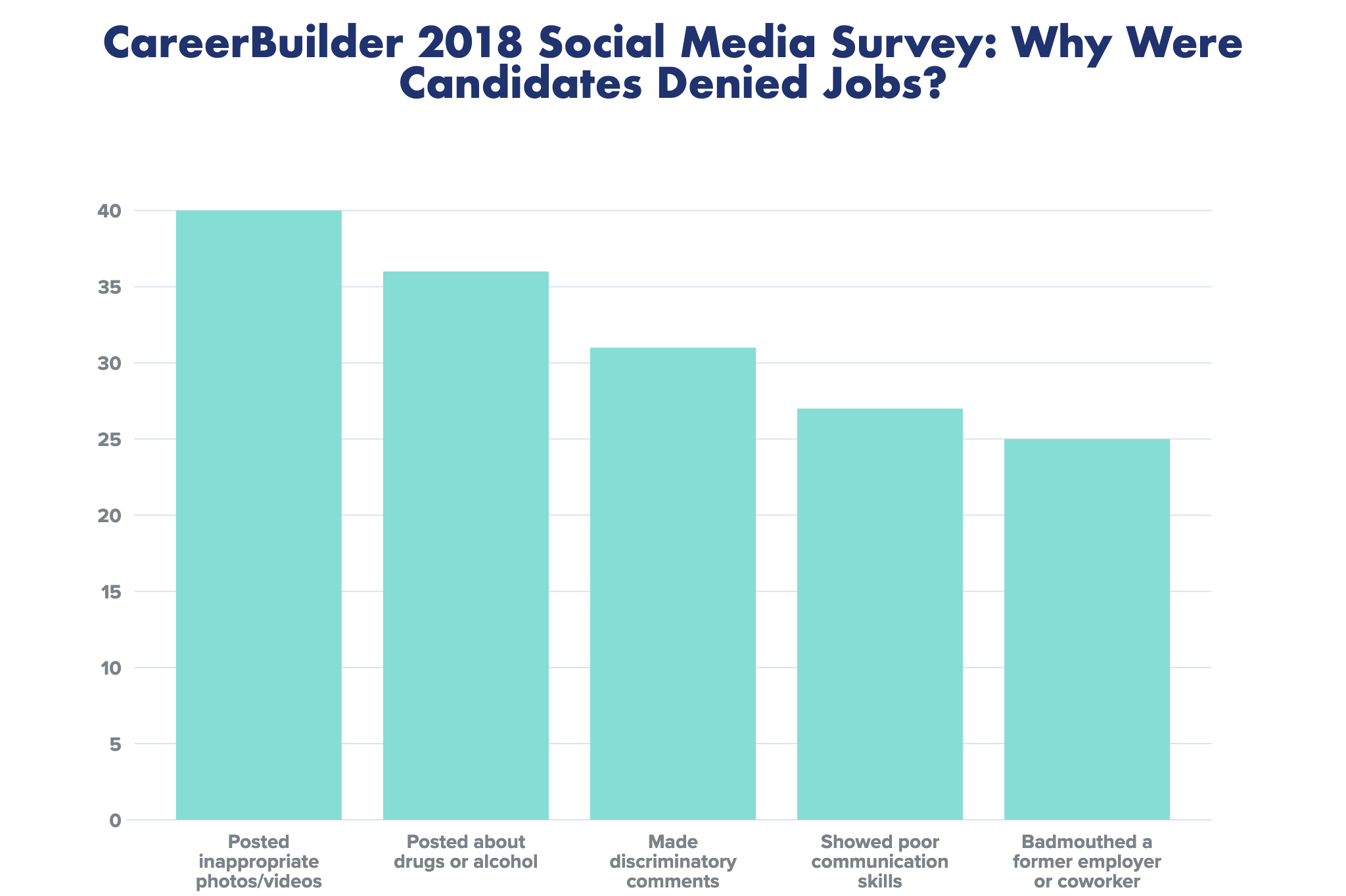
That CareerBuilder social media survey showed that…
- 40% of job seekers who lost opportunities posted photos, videos, or other information considered to be inappropriate or provocative
- 36% of prospective hires who were denied jobs had posted about drinking or doing drugs on social media
- 31% of passed-over candidates had made discriminatory comments on social media about race, religion, or gender
- 27% of candidates considered unfit for hire showed poor communication skills in their social media posts
- 25% of job candidates who were screened and denied employment opportunities had bad-mouthed a former coworker or employer
This just goes to show that almost anything you post on social media could be used against you during the hiring process. And while most of our survey respondents had never personally been involved in that process, that isn’t to say that they won’t ever be impacted by the effects of social media employment screening in some way.
Question 6: Has Social Media Caused You to Pass on Hiring?
That brings us to our next question: did our respondents have any real-life experience in social media employment screening? And if so, had they found that unethical behavior in social media had caused them to pass on a candidate?
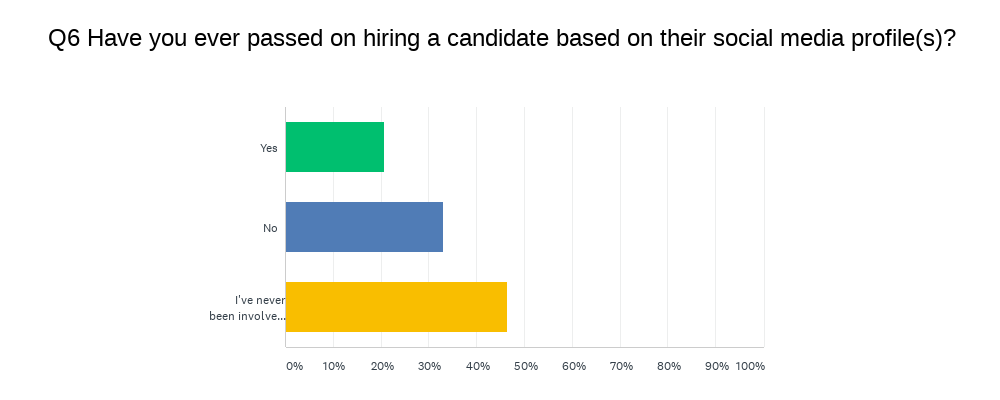
We asked our participants, “Have you ever passed on hiring a candidate based on their social media profile(s)?” The vast majority of survey respondents (almost 80%) said that they either had never been involved in the hiring process or that the results of social media screening for employment hadn’t caused them to turn down an applicant.

But for just over 20% of our survey respondents, social media employment screening had played a role in the decision to pass on hiring a prospective employee.
According to that recent CareerBuilder social media survey, around 70% of employers were using social media screening to learn more about potential hires. And in that survey, approximately 57% of employers found content that caused them to put candidates in the “no” pile.
If that information is enough to make you want to go off the grid, think again. Data shows that having a social media presence is usually better than having none at all. CareerBuilder found that 57% of employers are less likely to call someone in for an interview if the prospect doesn’t seem to exist on social media.
Like it or not, employers want to confirm details about your résumé (and about your personality) before they go to the trouble of bringing you in. That’s not entirely surprising, since it can take several months and thousands of dollars to find the right person for an open position and ensure they’re properly trained.
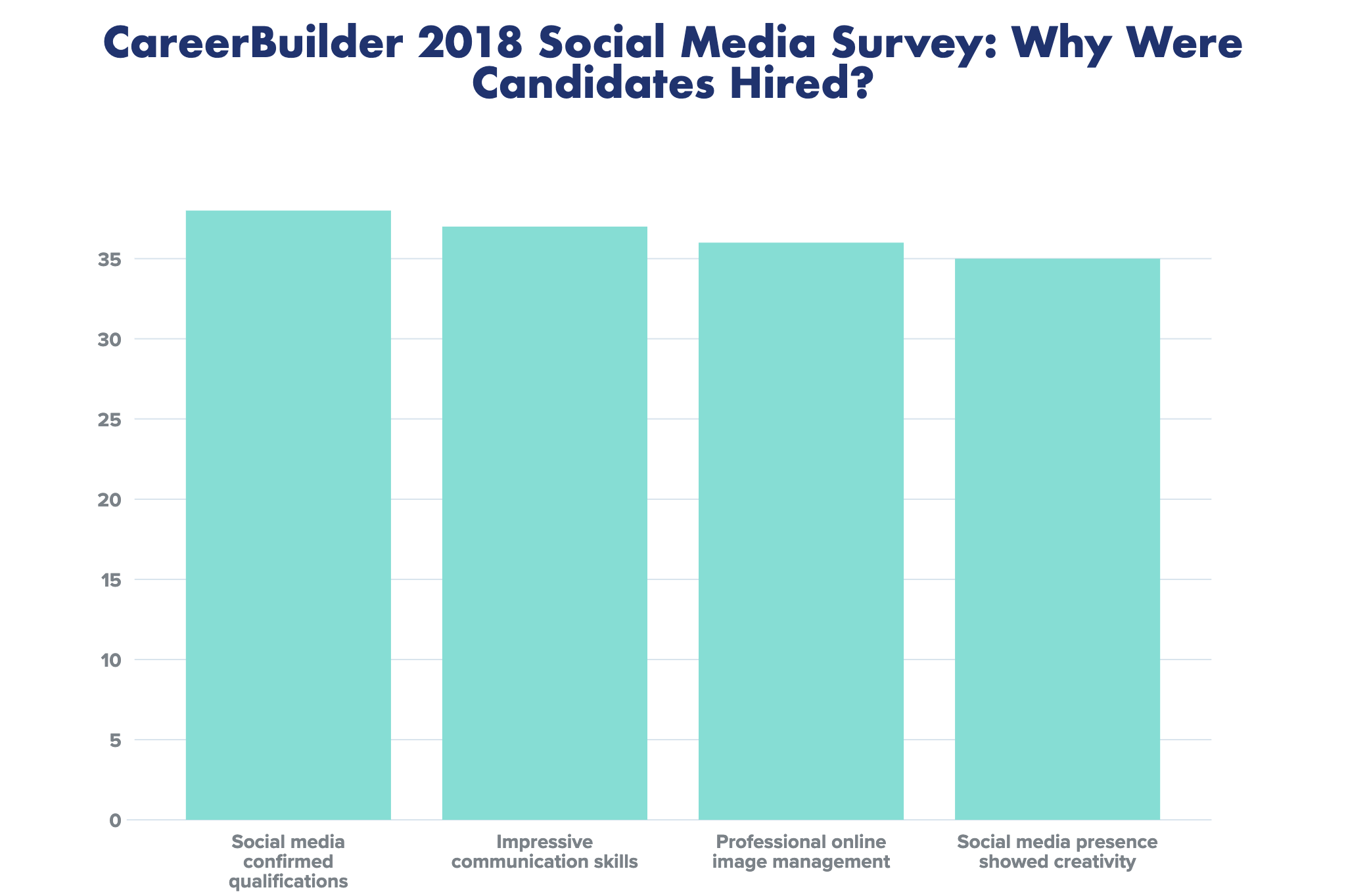
But it’s not all bad. That CareerBuilder social media survey points out that around 44% of those employers who made use of a social media screening policy actually found good reasons to hire a candidate when they snooped their social networking accounts:
- 38% of employers said social media screening confirmed the candidate’s background and job qualifications
- 37% of employers said they were impressed with the candidate’s communication skills on social media
- 36% of employers reported that the social media screening process showed them that a candidate maintained a professional image online
- And 35% of employers felt that screening a candidate’s social media accounts proved that the candidate would bring creativity to the job
Basically, if you engage in what’s considered appropriate social media behavior, you probably don’t have much to worry about. And if you’re adept at social networking, you might even stand out for the right reasons.
But even though the majority of our survey respondents said they didn’t post anything that would offend a prospective employer, they may not be particularly keen on being subjected to a social media screening policy – as we’ll see below.
Question 7: Should Pre-Employment Social Media Screening Be Required?
Next, we asked whether participants felt that social media employment screening should be considered to be par for the course when bringing on a new hire.
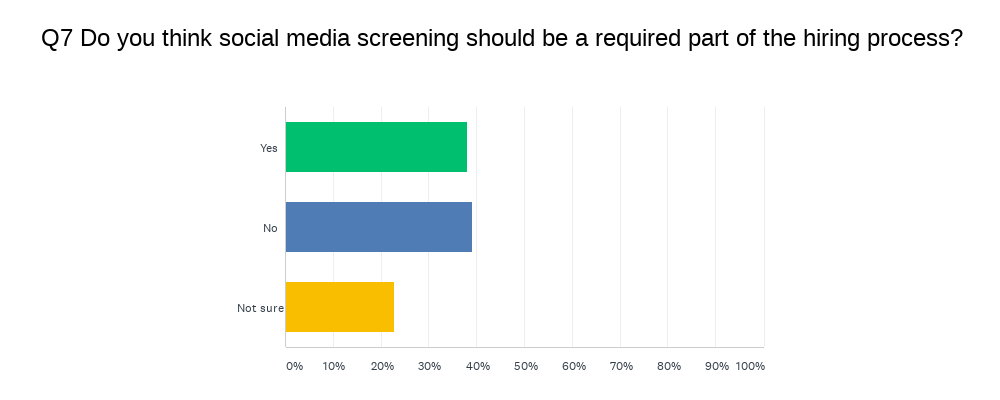
Our respondents were split here. As you can see from the data below, 38% of people felt that social media screening should be required for hiring, while just over 39% felt that this process shouldn’t be required. Another 22.8% weren’t sure whether social media employment screening should be mandated.

This division could be connected to the question of legality or the perception of an invasion of privacy. With that in mind, is social media screening ethical? For business owners, it’s in their best interests to engage in this practice. Not only can it save thousands of dollars by preventing bad hiring decisions, but it can also potentially help them avoid a PR nightmare later on.
If it comes out that an employee made inappropriate posts online after the fact, your brand reputation could be put at risk in the process. Screening social media accounts prior to hiring can prevent problems before they occur while ensuring the candidate is a good fit for your company culture.
Furthermore, social media screening is legally allowed – with one big exception. There are certain types of details that, even if they were discovered through social media, cannot legally be used to influence a hiring decision. These details would involve anything relating to the person’s race, religion, ethnicity, disability, marital or parental status (including pregnancies), or sexuality and gender identity or expression, in some states.
In short, an employer can’t base their hiring choices on personal information that falls under a protected class. Whether it’s something that was found out through social media screening or through other means, the employer could be hit with a discrimination suit if these details played any role in their decision not to hire you. But it's not illegal to make a hiring decision based on a person's behavior or opinions.
When it comes to legalities surrounding social media screening, there are a number of misconceptions. That’s especially true after the employee has been hired. As we’ll soon see, widespread misunderstandings surrounding your rights and protections can have big consequences at work.
Question 8: Is Being Fired For Social Media Activity an Infringement of First Amendment Rights?
Finally, we asked: "Do you believe that getting fired due to social media activity is an infringement of First Amendment rights?" This is the million-dollar question for us. It’s one we included on both of our previous Social Media Conduct Surveys. Since three years have passed since the last survey we sent out – and bad social media conduct has only become more publicly known in the interim – we assumed that we might have made significant headway here.
As it turns out, our assumptions were wrong.
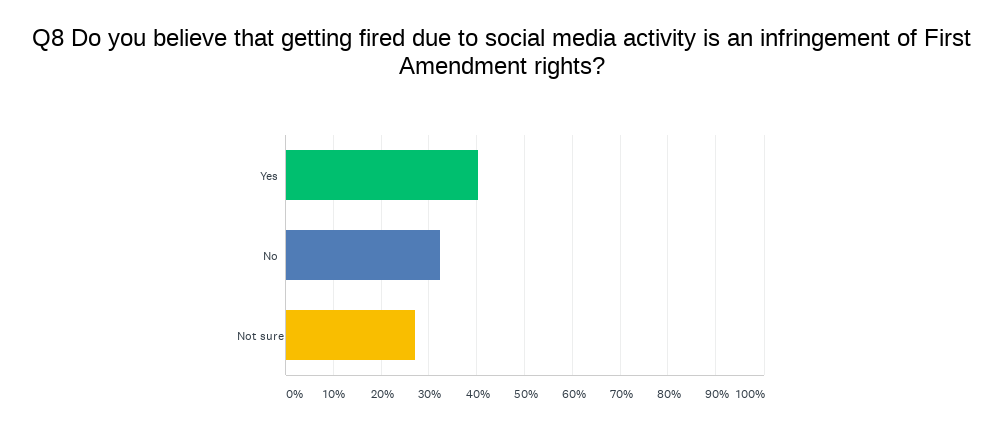
In our 2021 Social Media Conduct Survey, results show that over 40% of people believe that the act of firing employees for social media posts is an infringement of First Amendment rights. Another 27% weren’t sure whether social media firing cases infringed on these rights. All told, that means 67% of respondents are either misinformed about or lack confidence in the rights they’re afforded (and not afforded) under the U.S. Constitution.

While it’s true that the First Amendment protects freedom of speech (among other things), that does not mean you’re welcome to say whatever you want without consequences.
To be clear: the First Amendment, along with allowing for freedom of religion, prevents the federal government from interfering in your right to express yourself. That means that the government can’t restrict your freedom of speech in most instances. It also means you won’t typically be held criminally or civilly responsible for your speech (whether written or spoken) as long as it’s based on honest opinion or fact. This does not, however, apply to certain types of speech, like those that can be proven to incite violence.
 But the most important thing to note here is that private employers are not subject to the same rules as the government is in regard to freedom of speech. You can absolutely face disciplinary action from your employer if you post something on social media that goes against their values or that they feel would reflect poorly on their business.
But the most important thing to note here is that private employers are not subject to the same rules as the government is in regard to freedom of speech. You can absolutely face disciplinary action from your employer if you post something on social media that goes against their values or that they feel would reflect poorly on their business.
Even if your employer doesn’t have an established social media code of conduct for employees, they can still fire you for something you’ve posted online. Although there are a handful of states that bar employers from firing employees for things they say when they’re off-duty, this doesn’t apply when the speech in question contains discrimination of protected classes (like the ones we outlined earlier) or anything that would fall under the category of workplace harassment.
In other words, you might not always be fired for posting something that’s in poor taste, particularly if there isn’t a social media code of conduct for employees to which you’ve agreed. But if it’s discovered that you’ve posted something that can be constituted as discrimination or workplace harassment, there’s nothing stopping a business from firing employees for social media posts. And in many places, a post or comment doesn’t even have to be considered to be discriminatory for a legal firing to take place.
 That’s a freedom that around 34% of employers surveyed in the 2018 CareerBuilder social media survey put to the test. And in most cases filed against employers that alleged wrongful termination, courts have upheld the employer’s decision to fire the employee for their bad social media conduct.
That’s a freedom that around 34% of employers surveyed in the 2018 CareerBuilder social media survey put to the test. And in most cases filed against employers that alleged wrongful termination, courts have upheld the employer’s decision to fire the employee for their bad social media conduct.
Here’s the harsh reality: you’re welcome to post whatever you want online. But that doesn’t mean your employer has to tolerate it. Just as you’re free to make your own decisions, your employer also has that right.
 As with virtually any other situation, your choices are yours to make – but they come with consequences. While an employer probably won’t (or legally can’t) fire you for your beliefs, they can usually terminate your employment if you act out in a way that’s inappropriate or harmful to others on social media. So you should ask yourself if that's a risk you're willing to take.
As with virtually any other situation, your choices are yours to make – but they come with consequences. While an employer probably won’t (or legally can’t) fire you for your beliefs, they can usually terminate your employment if you act out in a way that’s inappropriate or harmful to others on social media. So you should ask yourself if that's a risk you're willing to take.
The lesson here? If you remember to think of those potential consequences before you act, you’ll be in a better position to protect your best interests.
Social Media Behavior: What’s Changed?
Our 2021 social media usage survey revealed some fascinating points about how our respondents behave and how they feel about common workplace practices.
But how did this year’s survey questions regarding social media differ from previous years? And has our shared stance on proper social media behavior and etiquette evolved?
Let’s compare and contrast some of the survey questions on social media usage from 2016, 2018, and 2021.
Inappropriate Social Media Behavior – Divisive or Offensive Posts
In our 2016 and 2018 social media questionnaire surveys, we asked respondents, “Do you ever post information or photos that could be offensive to others?”
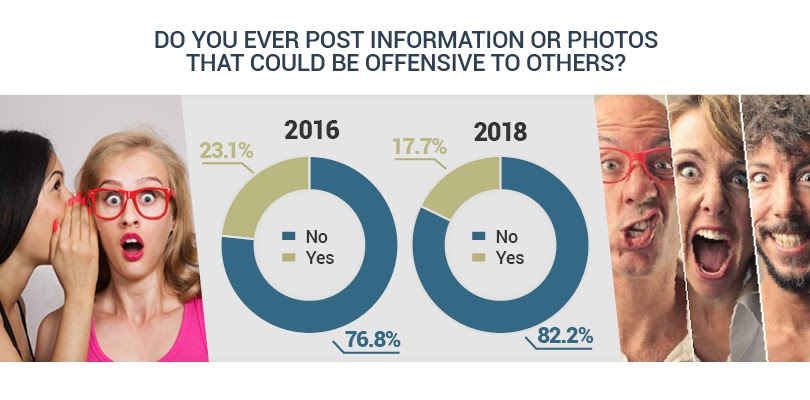
In both surveys, it’s clear that the majority of respondents steered away from publishing posts like these (or were perhaps in denial about how their posts could be seen as offensive).
Approximately 76.8% of respondents said they did not publish offensive social media posts in 2016, while 23.1% of respondents said they did. By 2018, 82.2% of respondents reported they did not post offensive content, with only 17.7% of participants answering that they had.
In 2016, we took this line of questioning a bit further. We further examined appropriate social media behavior by asking, “How often do you post comments and/or share content about divisive issues like politics and religion?”
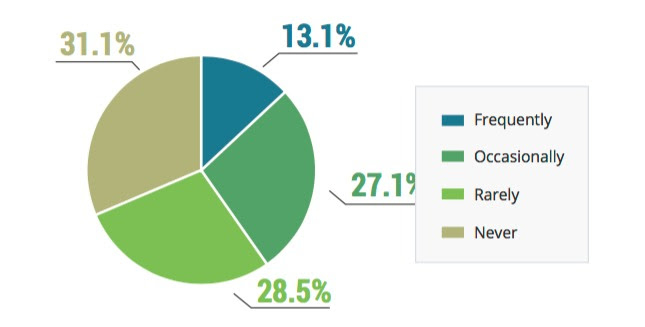
From the chart above, it’s clear that only 13.1% of respondents said they did so frequently. Around 27.1% said they did so occasionally, with 28.5% answering that they rarely shared or commented in this manner. Another 31.1% reported that they never posted or commented about religion, politics, or other divisive issues on social media.
When we posed this question in 2018, most of the figures stayed relatively constant (within about a percentage point). However, the percentage of respondents who said they never posted about divisive topics on social media rose to 33.8%.
We decided to ask this same question again in our 2021 social media survey. You can see the differences in the chart below.
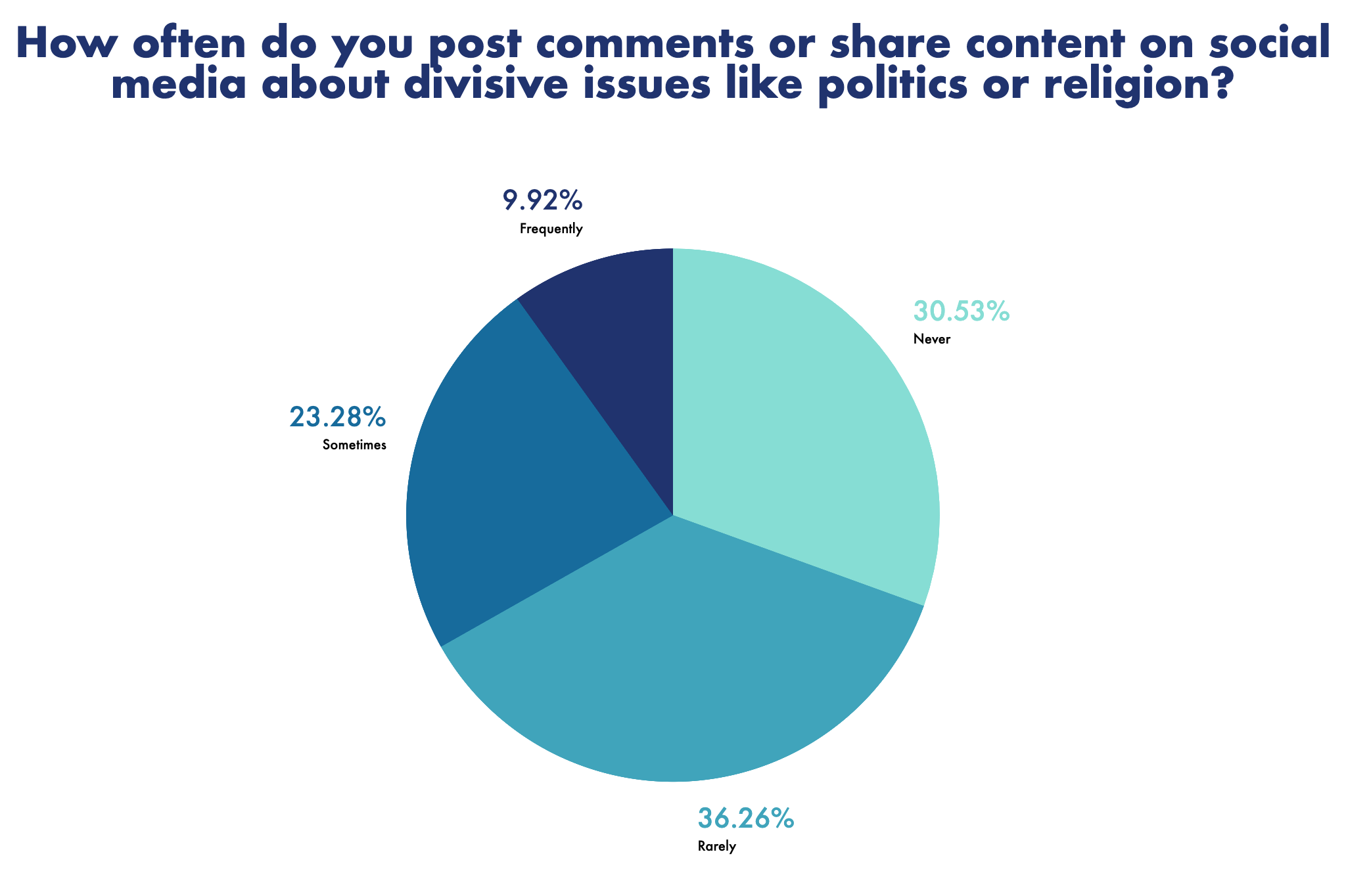
When you compare our 2016 and 2021 results for this particular question, a couple of areas stand out. The frequent posters group has seemingly decreased over the past five years, but the number of respondents who answered they “rarely” share divisive content has increased.
It may not be fair to draw exact comparisons here, as our survey platform methods and respondents have changed. However, it’s plausible that our view of sharing these kinds of posts has become more divided since 2016. While some people have come to understand the importance of sharing resources or speaking out on social media, others may have learned to stay silent to keep the peace or to protect themselves from a virtual onslaught.
Work-Related Unethical Behavior in Social Media
In our previous social media usage surveys, we wanted to know more about the intersection between the professional and the personal. Social media may fall into a gray area here, particularly as social media use becomes more prevalent (or even required) in the workplace.
In 2016, 2018, and 2021, we wanted to know whether respondents had ever posted criticisms of their jobs, their bosses, or their coworkers on social media.
Our two previous social media surveys posed this question with a simple yes or no answer. In 2016, 91.8% of respondents said they hadn’t engaged in this inappropriate social media behavior, while 8.1% of respondents said they had.
By 2018, even more people had seemingly realized that this behavior could get them into trouble; approximately 94% of respondents reported they had not criticized their colleagues or employers on social media, while only 6% said they had.
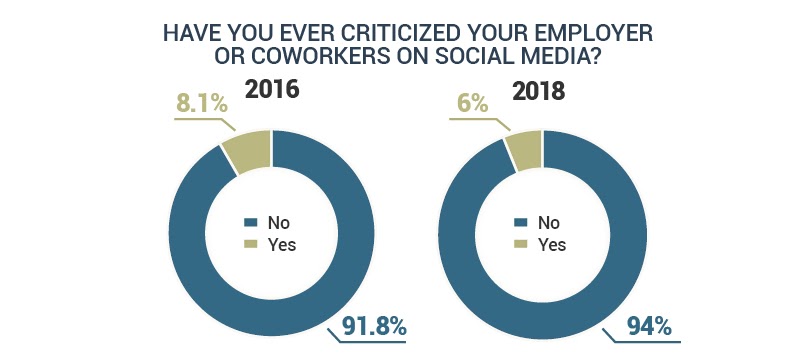
In 2021, we chose to get even more detailed with our survey questions on social media usage. We expanded the potential answers to this question, providing us with a bit more insight and nuance.
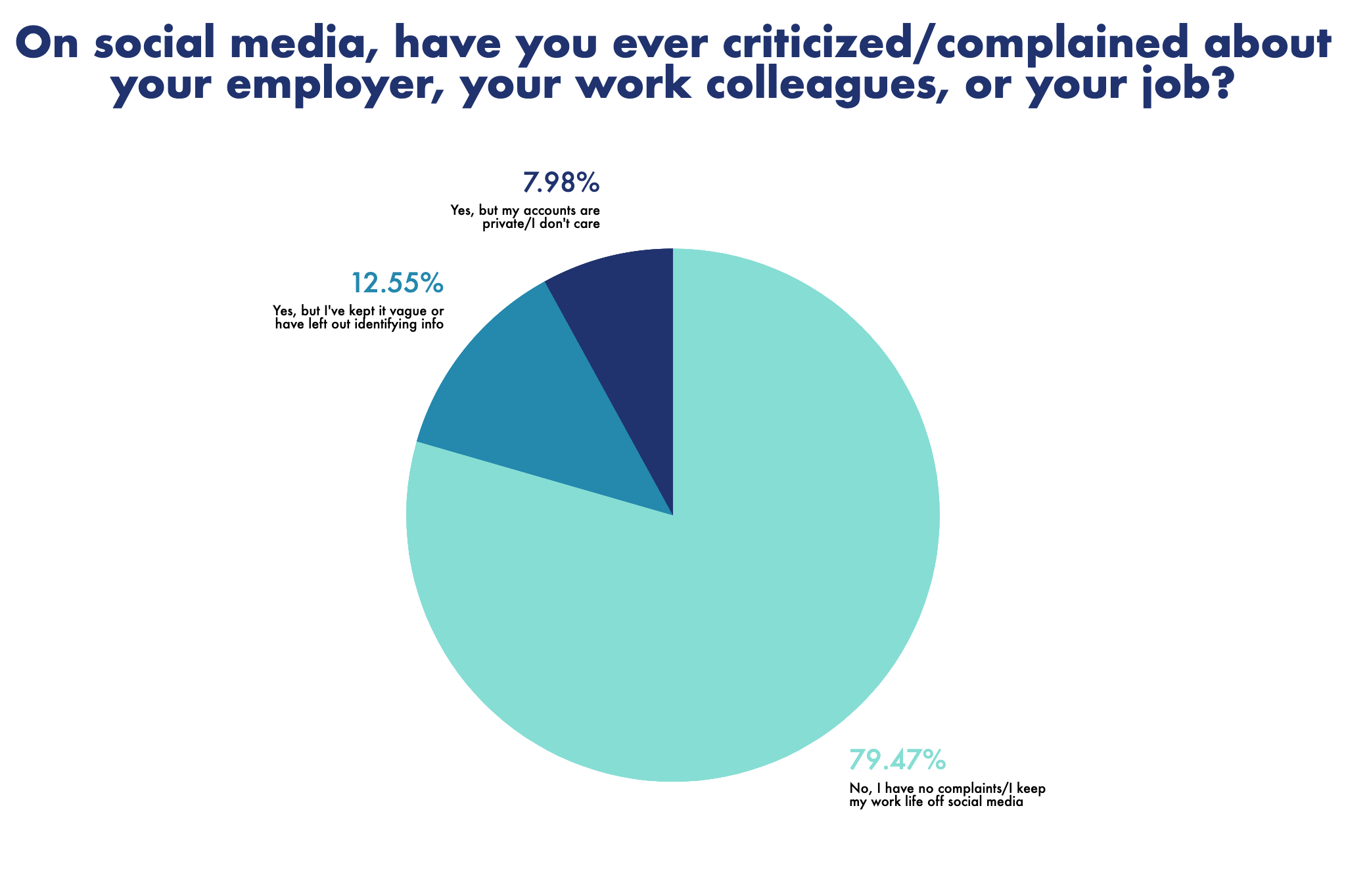
This time, around 79.47% of respondents said that they either had no complaints or that they keep their professional and personal lives private. In either case, this group said they had never criticized or complained about their jobs, their coworkers, or their employers.
Another 12.55% said that they had posted criticisms or complaints about work, but that they had either kept things vague or left out identifiable information. Roughly 1.90% said that they had posted this kind of content and that they didn’t care who was able to read it – a fortunately small portion of participants. Around 6.08% of respondents said that they had posted complaints or criticisms, but that their profiles were private.
This last group may raise some eyebrows, considering that internet privacy is a bit of an illusion. Back in 2016 and 2018, we took a closer look at the idea of internet privacy, offensive posts, and potential employment opportunities.
We asked, “If you plan to continue to post things that might be a turnoff to potential employers, why?”
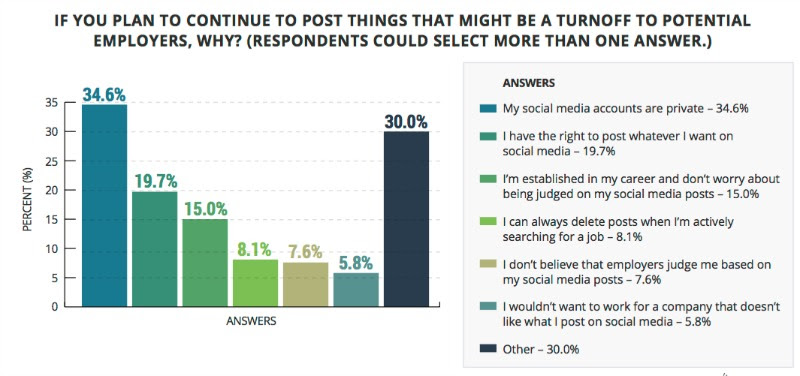
In 2016, approximately 34.6% of respondents cited the fact that their social media accounts were private. In 2018, only 30% cited this same answer.
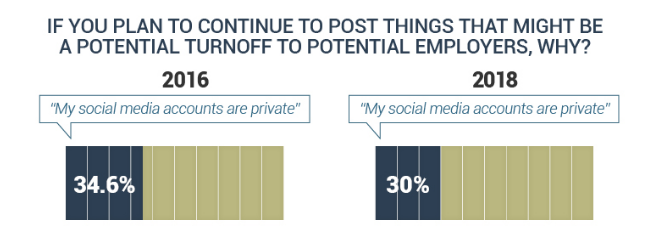
But even if you’re selective about accepting friends and followers, the reality is that social media accounts can be easily infiltrated or hacked. And since we’ve already established that many people don’t know how to properly set privacy settings, you can’t rely on the platform’s security features to protect you.
Someone in your circle of friends might even betray you, as is evidenced by another question we asked in 2016: have you ever taken a screenshot of someone else’s social media post to use against them?
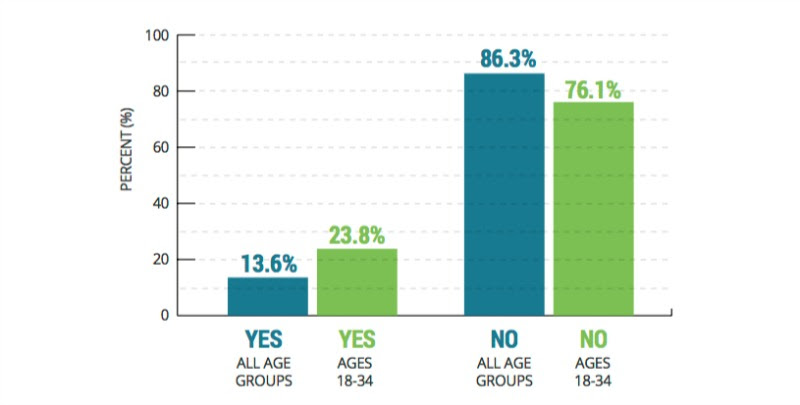
Although the majority of respondents said they had never engaged in this example of bad social media behavior, almost a quarter of young people said they had. Therefore, it’s not enough to hang your hopes on privacy settings. You’d be better off not posting at all.
Social Media Background Screening and Social Media Firing Cases
The issue of posting job-related complaints on social media brings up the possibility of social media employment screening, as well as firing employees for social media posts.
New to this year’s Social Media Conduct Survey, we asked about the biggest red flags for hiring potential employees, whether social media had played a role in hiring, and whether a social media screening policy should be required in the workplace.
But one of the most crucial questions we asked in all three of our surveys addresses whether social media posts are protected under the First Amendment.
Below, you can see the comparison of responses to this question in 2016 and 2018.
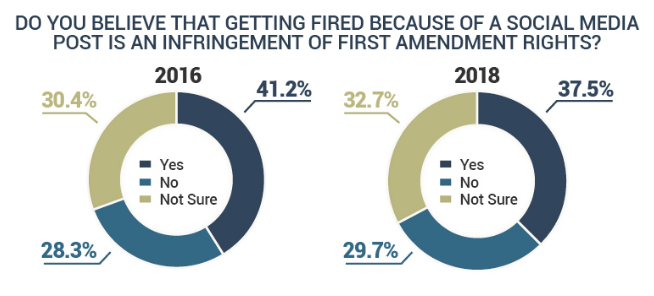
In 2016, 41.2% of respondents believed that social media firing cases represented First Amendment rights violations, with another 30.4% being uncertain about the issue. Only 28.3% knew that firing employees for social media posts is a legal practice that typically does not violate First Amendment rights.
The results from 2018 improved marginally in terms of constitutional knowledge. This time, 37.5% of respondents thought that social media firings violated First Amendment rights, though 32.7% said they were now unsure as to the legality. Roughly 29.7% of participants correctly understood that being fired for social media behavior from a private employer is allowed by law and that freedom of speech protects only from government action.
So how does this compare to what we found in 2021? We asked this exact question with the exact same response options, and this is what we found:
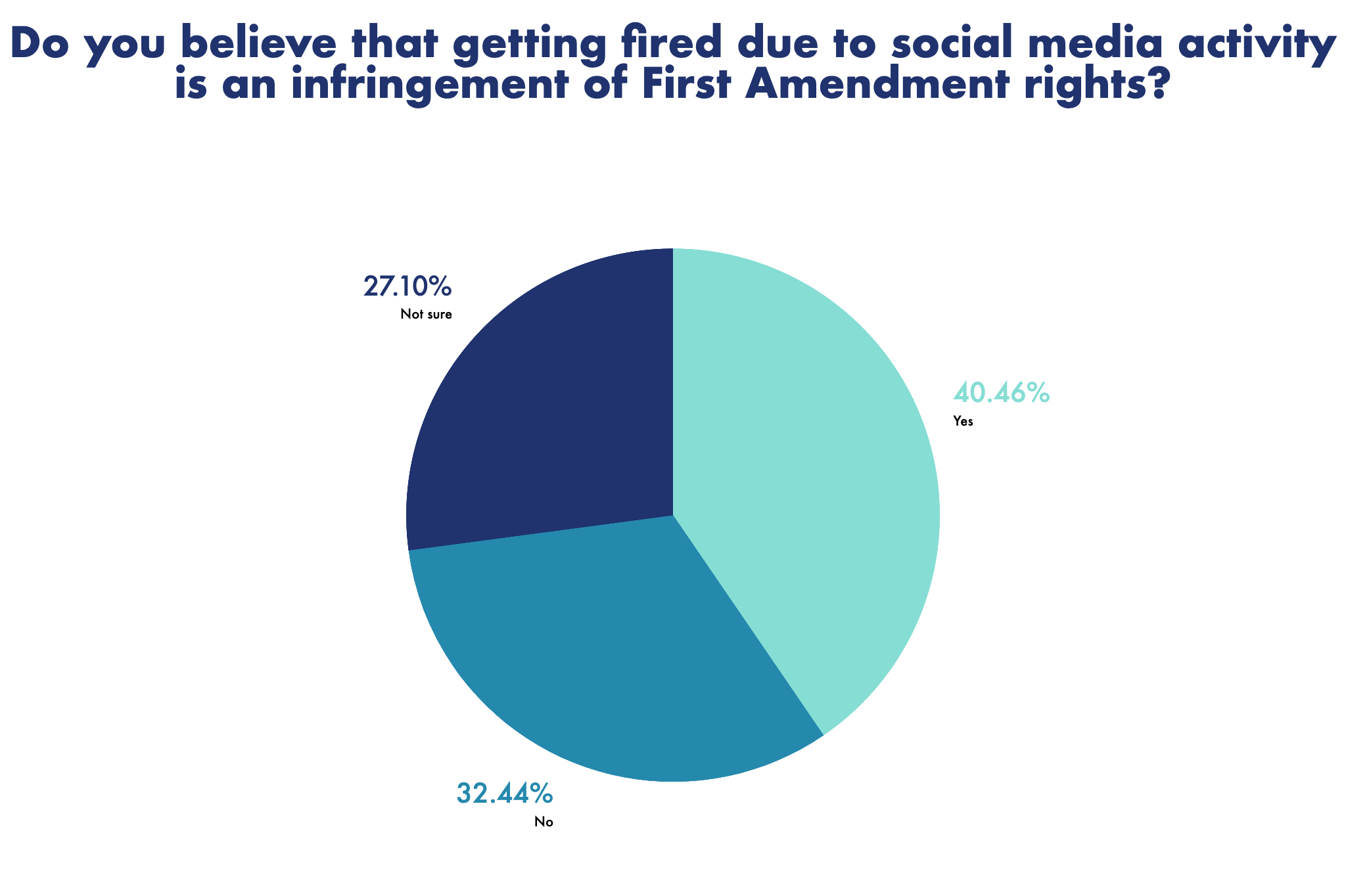
The good news here is that 32.44% of respondents were correct in their belief that it’s legal to fire someone working in the private sector for what they post on social media. That’s a 2.74% increase from our 2018 results. Unfortunately, 40.46% of people still believe that social media firing cases violate the First Amendment, while 27.10% remain unsure about the legality of these circumstances.
So while more people have a better grasp on the rights afforded by our constitution, confusion and misinformation are still common. As it turns out, what you don’t know can, in fact, hurt you.
Social Media Survey Conclusions
Overall, our social media usage surveys have revealed a lot about how we interact with others and how we feel about the impact of these platforms on our professional lives.
We know that more people are using social media than ever. It also stands to reason that workplace social media use has increased in recent years, particularly as companies have embraced remote work and are looking to improve company culture. Plus, more businesses are adding social media marketing efforts to their white label SEO plans to improve their online visibility.
In theory, it seems that most people understand that they should keep their opinions off social media – especially when they might be divisive or offensive in some way. But the temptation proves to be too much for many users.
 As more businesses adopt a social media code of conduct for employees and embrace social media employment screening, it’s becoming more important for workers to post with caution. It’s extremely easy for internet sleuths to tie a person’s bad behavior to their social media accounts and alert their employers of their inappropriate actions.
As more businesses adopt a social media code of conduct for employees and embrace social media employment screening, it’s becoming more important for workers to post with caution. It’s extremely easy for internet sleuths to tie a person’s bad behavior to their social media accounts and alert their employers of their inappropriate actions.
That doesn’t mean you should ghost your social media pages entirely.
Employers want prospective hires to be found on at least a few platforms. (Plus, these can provide ample networking opportunities to boost your career!)
Is social media screening ethical? In most cases, yes. Do employees like it? Not always. However, it’s a reality in our digitally driven society – so it’s a safe bet that it could become part of your employment journey now or in the future.
And if you happen to post something an employer might not like, you shouldn’t assume that platform privacy or the U.S. Constitution will protect you. As we mentioned before, you’re allowed to post whatever your heart desires. You just may not be shielded from undesirable outcomes.
To avoid an unpleasant scenario, we implore you to always think and take a pause before you post, double-check your privacy settings, and err on the side of caution.
Thank you!
Subscribe to our newsletter! Join us on social networks!
See you!






